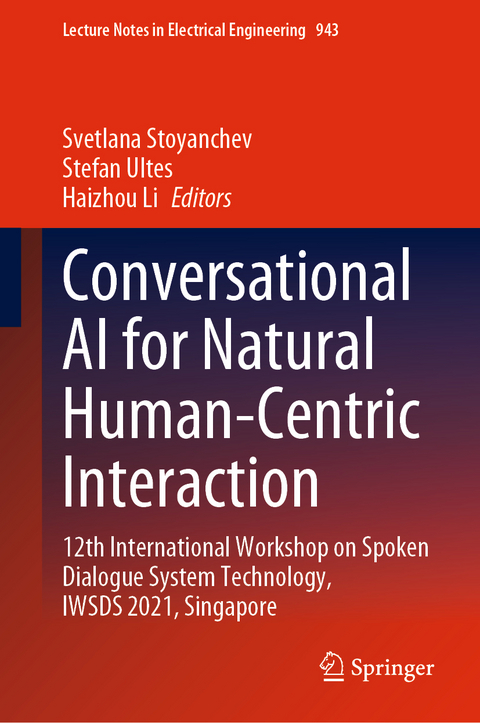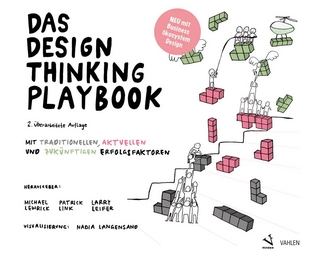
Conversational AI for Natural Human-Centric Interaction
Springer Verlag, Singapore
978-981-19-5537-2 (ISBN)
Svetlana Stoyanchev is a Senior Research Engineer and Dialogue Group Lead at the Speech Technology Group in Cambridge Research Lab, Toshiba, Europe. She received her Ph.D. in Computer Science from Stony Brook University. Her research interests include spoken, multimodal, and argumentative dialogue, error recovery in human-computer communication, information presentation, and dialogue analytics. Her recent work focuses on combining knowledge-driven and statistical approaches to modelling human-computer dialogue. Previously, she held research positions at The Open University, Columbia University, AT&T Labs Research, and Interactions Corporation. Svetlana served as an IEEE Speech and Language Processing Technical Committee Member in 2014–2016. She is a Member of the programme committees for research conferences and workshops, including SIGDial, ACL, AAAI, COLING, and Interspeech. She has Co-authored over 30 research publications in the field of dialogue and natural language processing andis Co-inventor of four US patents. Stefan Ultes is Dialogue Research Lead at Mercedes Benz Research & Development leading the Speech Technology research group. His research focusses on methods and technology that bring natural spoken human-machine interaction forward, thus contributing to the next generations of the Mercedes Benz User Experience. He Co-supervises several doctoral students and is a Lecturer in the “Dialogue Systems” course of the Dialogue Systems Group at Ulm University. Previously, he was a Research Associate at the Spoken Dialogue Systems Group at the University of Cambridge working with Prof. Steve Young and Prof. Milica Gasic within the EPSRC project “Open Domain Statistical Spoken Dialogue Systems”. He has received his Diploma (M.Sc.) in Computer Science from the Karlsruhe Institute of Technology (Germany) in 2010 and his doctorate in engineering (Ph.D.) at the Dialogue Systems Group at Ulm University (Germany) in 2015 on The topic “User-centred Adaptive Spoken Dialogue Modelling”. Haizhou Li received the B.Sc., M.Sc., and Ph.D. degrees in electrical and electronic engineering from South China University of Technology, Guangzhou, China, in 1984, 1987, and 1990, respectively. He is now a Presidential Chair Professor and Associate Dean (Research) at the School of Data Science, The Chinese University of Hong Kong (Shenzhen). He is also with the Department of Electrical and Computer Engineering, National University of Singapore (NUS), Singapore. Dr Li has worked on speech and language technology in academia and industry since 1988. He has taught in The University of Hong Kong (1988-1989), South China University of Technology in Guangzhou, China (1990-1994), Nanyang Technological University in Singapore (2006-2016), University of Eastern Finland (2009), and University of New South Wales (since 2011). He was a Visiting Professor at CRIN/INRIA in France (1994-1995). Prior to joining CUHKSZ and NUS, he was a Research Manager in Apple-ISS Research Centre (1996-1998), Research Director of Lernout & Hauspie Asia Pacific (1999-2001), Vice President of InfoTalk Corp. Ltd, and General Manager of InfoTalk Technology (Singapore) Pte Ltd (2001-2003), the Principal Scientist and Department Head of Human Language Technology at the Institute for Infocomm Research (2003-2016), and the Research Director of the Institute for Infocomm Research (2014-2016), the Agency for Science, Technology and Research, Singapore. He Co-founded Baidu-I2R Research Centre in Singapore (2012). Dr. Li is an IEEE Fellow, and ISCA Fellow. Dr. Li's research interests include automatic speech recognition, natural language processing, and information retrieval.
Out-of-Scope Domain and Intent Classification through Hierarchical Joint Modeling.- Segmentation-Based Formulation of Slot Filling Task for Better Generative Modeling.- Can we predict how challenging Spoken Language Understanding corpora are across sources, languages and domains?.- Personalized Extractive Summarization with Discourse Structure Constraints Towards Efficient and Coherent Dialog-based News Delivery.- Empathetic Dialogue Generation with Pre-trained RoBERTa-GPT2 and External Knowledge.- Towards Handling Unconstrained User Preferences.- Jurassic is (almost) All You Need: Few-Shot Meaning-to-Text Generation for Open-Domain Dialogue.- Comparison of Automatic Speech Recognition Systems.- Multimodal Dialogue Response Timing Estimation Using Dialogue Context Encoder.- Eliciting Cooperative Persuasive Dialogue by Multimodal Emotional Robot.
| Erscheinungsdatum | 23.11.2022 |
|---|---|
| Reihe/Serie | Lecture Notes in Electrical Engineering ; 943 |
| Zusatzinfo | 47 Illustrations, color; 30 Illustrations, black and white; XV, 306 p. 77 illus., 47 illus. in color. |
| Verlagsort | Singapore |
| Sprache | englisch |
| Maße | 155 x 235 mm |
| Themenwelt | Informatik ► Software Entwicklung ► User Interfaces (HCI) |
| Informatik ► Theorie / Studium ► Künstliche Intelligenz / Robotik | |
| Technik ► Elektrotechnik / Energietechnik | |
| ISBN-10 | 981-19-5537-9 / 9811955379 |
| ISBN-13 | 978-981-19-5537-2 / 9789811955372 |
| Zustand | Neuware |
| Informationen gemäß Produktsicherheitsverordnung (GPSR) | |
| Haben Sie eine Frage zum Produkt? |
aus dem Bereich


